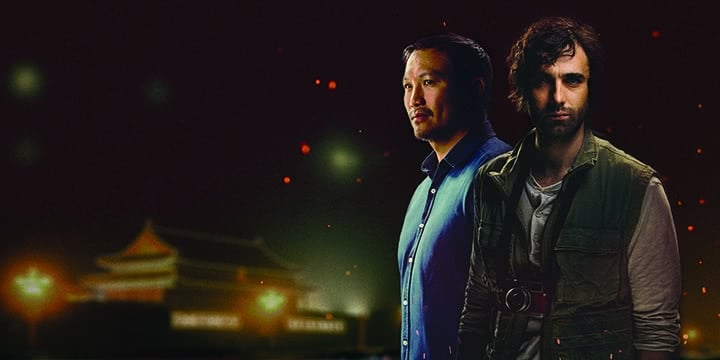The 1989 pro-democracy protests in China gave us the iconic image of ‘Tank Man’, the anonymous shopper staring down a wall of Type 59s the day after the Tiananmen Square Massacre.
In February 2017 we have an alarmist, belligerent leader of a superpower at the onset of his presidency; who knows what image may come to define the uncertainty ahead? Relations between China and the US have rarely boded this poorly, and yet Chimerica was written long before the rise of Trump or Xi Jinping’s foray into the South China Sea. Jason Chong, one of the co-stars of Sydney Theatre Company’s Australian premiere, explains how this 2012 play is suddenly very timely.
“I think it’s very relevant,” Chong says, stepping out from rehearsals. “There are moments in the play where some of the characters talk about the lead-up to the re-election of Obama. So there’s a bit of that going on, and that gives us a sense of the timeline. But I think people will find the irony of what’s happening within the play and what’s currently happening quite interesting. I don’t know if it’s the brilliance of [playwright] Lucy Kirkwood that she could see this all happening, because there are moments here where you stop and think, ‘Now that’s just uncanny. This was written when?’ If you don’t have the political landscape present in your head – either today, or what it was back then – or if you know it well, either way, you’ll still take away a lot from this production.”
Chimerica is an epic production. With five acts spread across three hours, it is an ambitious undertaking, not least because of the 21 NIDA students enlisted to flesh out the story’s international scope. From New York to Beijing, we follow the efforts of two men – Chong’s character Zhang Lin and Mark Winter’s Joe Schofield – attempting to uncover the identity behind one of the century’s most defining acts of protest.
“We’re seeing two characters who are counterpoints of these big powerhouses,” Chong explains. “[Winter] plays a photojournalist who took an iconic photo of the Tank Man back in ’89 in the pro-democracy uprising, and my character is a student who loses his wife and unborn child during this massacre. So both are dealing with PTSD, and when people go through that sort of trauma, like going through a war, you tend to flock towards that same kind of person, because only they will understand what you’ve been through. We become friends because of it, but then he hears that possibly the man who stood against the tanks could be living. So he’s fascinated; I’m fascinated by the prospect of that. And the rest of the play is a detective story, in trying to unfold where this person is, what are the questions you would ask such a person.”
History today is moving faster than ever, and there are smartphones everywhere to document its progress. Acceleration can be an invigorating thing, but once the ride starts rattling on its track and the wind starts to sting, that momentum can turn treacherous. People grow distrustful and frightened; governments turn vicious. The US has been rattling its sabre towards China with escalating force over the last several months, but despite the rhetoric and posturing, the history binding these two countries together is strong. Whether that strength is enough to anchor two increasingly polemic identities, however, remains to be seen.
“It resonates right now in the political landscape in which we’re living, particularly between those two powerhouses,” says Chong. “After the GFC, China bailed out something like $1.7 trillion of America’s foreign debt. So there’s this connection between the two countries, but there’s this disparity in the way each country operates. Clearly, the Communist Party has a tight rein on censorship in China while there’s such capitalism in the United States. The US has this idea of spending money to make money, whereas, culturally speaking, China tends to save money for that rainy day. And then of course you have Trump’s last few weeks, wanting to control the media and tightly control borders. So we’re seeing an interesting time in our history, and this particular play touches on that very much.”
Politics aside, at its core Chimerica seems a production concerned with the human cost of history – what becomes of the survivors once the dust of trauma settles? What became of Tank Man, or the drivers of the Type 59s themselves? It is an emotional production, and one that requires tremendous efforts from its cast to maintain the truth behind the fiction.
“I’ve just come out of a rehearsal, where I’m being interrogated,” Chong says. “And there’s an emotional and physical drain as a performer there. But it’s also your job as a performer to arc that. It’s about finding where you need to put the energy, looking at your journey over the five acts and to work out where we need to amp it up, where you need to slow down the wheels. It’s organic, because it won’t happen overnight to get to where you need to be.
“It’s a special piece, which we haven’t seen in Australia. We also haven’t seen this many Asian actors together onstage, especially at the STC. It’s groundbreaking for a lot of us. This 2017 season there’s diversity across the board, and stories that reflect what we are as Australians right now. It’s exciting.”
Chimerica runsTuesday February 28 – Saturday April 1 at Roslyn Packer Theatre.


































